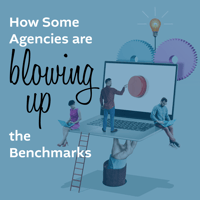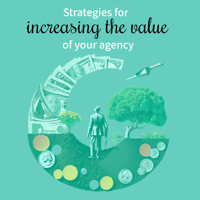There are several key benchmarks that independent insurance agencies use to measure their success....
Hiring In a Scratch Agency
When Should a Scratch Agency Hire its First Employee?
As an owner, starting from scratch is one of the most rewarding but also challenging endeavors you can undertake. Many owners begin their journey inspired by prior experience as a successful producer or employee at another agency. In the beginning, the number one goal is to write business and build up your book. Producing on your terms is the dream, however, you quickly get to a point where the demands on your time are being pulled away from production to more service, endorsements, claim questions, bookkeeping, or anything else that may reduce the time you spend producing on your terms.
Being a great producer will quickly present you with the necessity to support your momentum. As an agency owner, you may ask yourself, “When do I hire my first employee?”
The difficult part of this stage is there is no one right answer or perfect roadmap that gives you a step-by-step guide on scaling your scratch agency. The best part is you can create your plan to grow your agency with the right people in the right positions at the right time.
As employee #1 you are wearing every hat needed to keep the agency moving forward. Once at the point where your time is being divided and causing you to lose momentum, that may be an indication that support is needed. When you are having to dive deep into every role needed to maintain the business you could easily start chasing everything that demands your attention and lose traction.
Although being a jack or jill of all trades is the primary way that most scratch agencies get off the ground, the only way to scale your agency is by empowering others to join your vision. This includes Identifying the roles you can contribute to the agency with the most value and bringing in others to support the roles needed to accelerate your vision. The following are a few considerations that can help you determine when and which roles to hire in your agency.
Map out your current roles and identify where you need support
Every business operates within the same three functions:
- Sales/Marketing
- Operations
- Finance
Achieving operational excellence starts with identifying the current operations you are fulfilling within these functions for your agency and scoring each one as a strength or opportunity for growth. Given these three functions are important for the success of your business, these must be done well once your agency reaches the scale to manage multiple needs simultaneously.
This quick exercise can help you begin to think in terms of accountability for these functions:
- Draw three boxes on a sheet of paper and label each one with one of the functions listed above.
- In the respective box write down the top 3-5 roles or activities you are fulfilling for that function that requires dedicated time from you and an estimate of how much time you spend per week (in hours or percent of working time) on that role.
- Note, this doesn’t have to equal 100% if you don’t list all roles, but at least try to capture how you spend the majority of your work week.
- Examples:
- Sales/Marketing write things like - Calling to set appointments 10%, Networking at community events 10%, and Guest speaking at community events 1%.
- Operations - Generating 2-3 quotes for prospective clients 15%, Setting up policies in the AMS 5%, Creating proposals for prospective clients 15%, Negotiating with carriers for new appointments 5%.
- Finance - Handling carrier payables for agency bill policies 10%, Bookkeeping and entering expenses each month 5%, Paying the company expense card statement each month .5%, Learning to use the AMS accounting functions 15%.
- Once you’ve identified the current top roles you are fulfilling and how much time they take each work week, identify whether you doing that role provides traction for your agency or friction causing roadblocks for your continued growth.
- Now get another piece of paper and separate it into two columns labeled Traction and Friction. In the respective columns write down the roles that you identified and the time allocation.
While you shouldn’t just take this paper and create a job description for your first hire, it can give you some guidance on the types of roles you should consider hiring first so that you can put the right person in the right seat to support your agency’s vision for growth and compliment your skill set.
Take the time to anticipate when you need to hire before you need to hire
Now that you have a better understanding of where you may need support, knowing when you need support is critical. Some anecdotes state that you should hire into growth instead of hiring for growth, which is much easier said than done. Hiring as a scratch owner will often have significant opportunity costs while you are searching for and onboarding a new hire. However, the purpose of hiring is that the investment in growing your team will yield greater long-term results. By anticipating when you should hire, you can also make efforts to reduce some of the lost opportunity costs when you are going through this transition.
What are some ways to plan when it is the right time to hire? Knowing your agency’s numbers can keep you ahead of the curve in preparation for when inviting others in to keep the traction going. Every agency is different, so understanding the data behind your workload can help you put indicators in place on when to consider bringing on someone else.
If you notice a shift in service work and less availability for production activity, pull a book of business report to gauge your current client and policy count. There are measured standards for productivity that agency staff can reasonably handle. Based on your agency’s book of business mix it could be a threshold of a certain policy count, revenue threshold, or combination of the two. Knowing where the “tipping point” is once your book gets to a certain size will help you look ahead to start searching for the appropriate support role before hiring out of desperation because one of the three functions is suffering.
This is something we help agencies recognize quite often through a productivity study. We can use your agency’s book of business and other service level data to help determine if staff is handling an appropriate amount of workload based on a few key data points. So, whether you are a team of one, a small team, or a large agency there are ways to evaluate productivity and see if you are appropriately staffed.
Hiring can seem expensive, but the right hire will produce more value
One of the biggest hurdles to hiring is the next question, “Can I afford to hire someone?” The answer to this question can certainly depend on the amount of revenue the agency is generating, but also on determining which role you need to fill.
Outsourced services can seem expensive when you first start, but delegating roles to someone who is better equipped to complete the job provides you the support to reallocate your time to more valuable tasks like production or client service.
Are you struggling with administrative or data management tasks? Virtual assistants are a great way to delegate admin or operational functions of your business that may not require a licensed agent to complete. Part of the onboarding process when hiring a virtual assistant is ensuring high confidence in training to accomplish the assigned roles. So again, this is a system that allows you to outsource transactional roles to someone skilled in completing those roles efficiently.
If outsourcing or non-licensed contract hires are not the right options for the first role you need to be filled, then understanding the cost of hiring an employee becomes a little more important. Hiring a W2 employee requires a few other residual costs that should be accounted for when budgeting for your first hire. You’ll likely need to cover payroll taxes, potential benefits costs, workers' compensation insurance, and others depending on your local labor laws.
Focusing your attention on where your skillset is generating the most value and traction while others are helping fulfill other functions of the agency is the primary way that you will achieve the growth you desire.
I was also interviewed on the Scratch Agency Podcast with Steven Turnbull with T5 Insurance and Shawn Fitzgerald of LAF Advisors to discuss when a scratch agency should hire its first employee. You can listen to that episode on Spotify.
Don’t know where to start? Let’s chat
Feel free to schedule a quick call if you are a scratch agency owner and finding yourself in a rut trying to prioritize efforts for growth. Whether it's evaluating your cash flows, understanding your productivity data, or setting goals for your agency we can work with you to create a plan to hire for growth.



